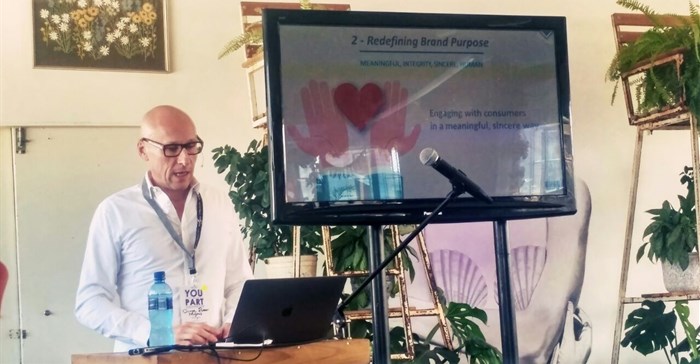Marketing & Media trends
Industry trends
BizTrends Sponsors
Trending




 Does anyone know what content is any more?Justine Drake
Does anyone know what content is any more?Justine Drake
Jobs
- Marketing Manager Johannesburg
Olivier Robert-Murphy shares key marketing, media and music trends for 2018

Robert-Murphy leads UMG's brand, comprising an award-winning team of global music, content and partnership experts. Having been selected as jury president of Cannes Lions Entertainment for Music last year, he started his presentation, on key marketing, media and music trends, by saying that it is at the festival that he saw first-hand evidence of how every single industry was going through a digital transformation. He shared this experience with the audience by screening some of the work that really impressed the judges last year.
First up was the now famous campaign, One Source - made right here in South Africa by Absolut Vodka. For those who don't know, Absolut Vodka comes from one source in Sweden, and the one source of culture and creativity comes from Africa.
One Source is a celebration of African unity and together with Khuli Chana, Absolut created a documentary series – an EP, a music video – which embarked on a journey across Africa to Ghana, working with many local artists, in an expression of creativity.
As a successful campaign, it went on to gain 1.75 billion impressions – the song went to number 1 on iTunes, the sales of Absolut Vodka increased by 84% year-on-year and the market share doubled from 14% to 28%. So, the question now is, why? And why, is exactly what writer and marketing consultant, Simon Sinek explains in his book called Start With Why. He states that instead of asking, "What do I sell and where do I sell it?", which is what most brands do, think more about why.
To illustrate this, he gives the example of Apple. Apple doesn't sell computers or mobile phones, he says, they sell a way of thinking differently about design. It just happens that they sell computers and mobile phones. In the same way, if you think about Red Bull; "Red Bull gives you wings." Think about Coca-Cola; "Open happiness." Robert-Murphy says at Universal Music as well, it's not about CDs or vinyl anymore, it's about emotions and moments. Which brings us to the first key marketing trend on his list for the next 18 months; the consumer experience.
1. Consumer experience
He says many agencies and many brands don't see consumer experience as a priority. How do you make people feel, that is what it’s all about. Before you thought of a consumer experience as; you go into a store and you have someone advising you and you can buy your product - face to face relationship = great customer experience. But how do you do that in a digital world? Well, to do that you need, as a consumer, to feel special. And even if it is a digital connection, it starts with 24/7 availability. So, when you are calling a brand, you want a brand to respond immediately. That's why chatbots exist. "It's also about having a practical approach as a brand," he said and gave us an example. “I ran out of Nespresso capsules in December. Last week, I realised I need to re-order and then I got an email saying, ‘Hey, it's time to re-order.’ I don't know how they do it but they do it. That's a consumer experience.”
2. Redefining brand purpose
"Brands should behave as humans," he says. Yes, according to Robert-Murphy, brands should have values and life purpose. He says for him it was interesting to see the results of a survey called Meaningful Brands Index. They classified the brands that were the most meaningful, who created the most authentic relationship between the consumer and the brand and he was very surprised to see that because of this, these brands have the highest market value on the stock exchange. So, it's not just about perception, it is business purpose. This is not fake, in fact, it's all about caring about the consumers and using all of the available channels to communicate that.
3. Digital transparency
Last year, Procter & Gamble stopped spending $160m on digital Adspend for two months and then two/three months after the company's sales rose by 0.2%. Unilever has internalised all their media buying and in-store advertising, enabled by a continuation of its strategy of moving some marketing elements in-house and reducing the number of agencies it works with. It shows that viewability and digital measurement is the number one issue facing brands and agencies today, especially media agencies. The 2018 goal is to overcome it.
4. Intelligence
We started interacting with our computer through a keyboard. Then we started to touch the screens. And now, it's all about voice. Voice is easy, voice is human. It's the best interface for brands to connect with consumers and to create those personal connections. For example, in China, 40% of consumers use the voice activations on their mobile phones at least once a week. Another example is Amazon's Alexa. 60% of people who interact with Alexa say please and thank you to the device because it sounds human and they interact with it as if it is. Voice will definitely be big in 2018.
In short, marketers should remember:
"We live in a world where people want to be brands and brands want to be people."Content is key
Robert-Murphy says this is because audiences are smart. They know how to use technology. For example, he says, “On my mobile phone I use adblocking. On Youtube, we skip the ads. So, brands need to be clever to get consumers' attention because people won't skip the ad if the content is right.” Content, he says, is very important. You need to communicate differently to today's audience and the best way to do that is through branded content.
If you communicate in an authentic way, people will watch it up until the end. Below is an example of an ad that did just that.
Robert-Murphy says 78% of CMOs think branded content is a feature of marketing. It's all about content. To give another example of just how important this is; 74% of people will not care if their favourite brand disappears tomorrow. There's just no more loyalty. So, what do you do? You either create the loyalty or you constantly drive a new audience, he says. For example, what if a brand like Taylor Swift was going to disappear/take a break, Robert-Murphy says he guarantees that 100 million people would definitely care. He says this is a good example of how the marketing world has changed.
The 4Ps make way for the 4Es
In the past, we have been trained to follow the 4Ps:
- Product
- Price
- Place
- Promotion
Well, forget all that, he says. The 4Ps are gone forever. Welcome to the 4Es.
- Engagement – From the engagement officer's point of view: how do I create engagement with the consumers?
- Experience – From the brand's point of view: how do I create the best experience possible?
- Exclusivity – From the consumer's point of view: how can I, the consumer have access to this?
- Emotion – This is with regards to the product.
However, this is not enough. This was right a few years back. Robert-Murphy says he does believe that now things have shifted a bit. Right now, it is more about:
- Data
- Storytelling
- Intimacy
Data, storytelling and intimacy
The question is, can we supply intimacy in a world of brands? How do you create an intimacy between one person/brand and millions of people? Well, in one word; data. Social networks are incredible sources of data. Through social networks, you can find out everything about an individual. You can find out what they like, what they do, where they go. For example, through data, you know that this specific person likes listening to Justin Bieber at 7am in the evenings while sipping on a glass of rosé. If a related brand had to reach out to this person at that very specific time, it is more than likely that the person would engage with the brand.
With storytelling, Robert-Murphy thought the best way to illustrate what this entailed was to share a few more 2017 Cannes Lions case studies with us. First up was the Adidas Originals case study. The Adidas brand Originals is a vintage look of the trainers. Adidas decided to re-record a song from Frank Sinatra called, My Way for the campaign. But it wasn't just a song. It was a cross-over of art and expression from music, dance and designers. The impact of media was in the 100 million plus figures.
The next case study was from Germany. Edeka is a small supermarket chain. And they decided to do something special and to tell a real story. They partnered with an artist called Neele Ternes who sang the song for the ad and it is incredible to see how the song worked perfectly for the campaign. Get the handkerchiefs ready.
Another example, the brand decided to create a story for a cause. The campaign tells the story of a singer, Diego Dibos who wrote a song about a man who gave his wife a second chance. Watch until the end when a shocker is revealed.
The next case study features hip-hop artist, Rick Ross, who “can buy anything he wants” but he decided to buy back a local fast-food joint that he grew up with in order to create jobs for members of the community.
This case study illustrates how a campaign can be meaningful and authentic.
The last case study example is a campaign done for Air New Zealand by Universal Music. Robert-Murphy says thanks to data and insight, they (Universal Music) suggested Air New Zealand work with singer, Ronan Keating on the campaign. What they wanted to achieve with the ad was to interact with people outside New Zealand. They wanted to create a unique Christmas ad for the holiday season and because there is no snow in New Zealand, they came up with a concept called 'Summer Wonderland'.
This is what it looks like:
In conclusion, Robert Murphy says it is all about the right idea, it's about the right insight, it's about the right talent and if you can fuse this together in a meaningful and an authentic way, then you get this type of award-winning campaigns.
For more on the Universal Music Group, click here to view their website, click here for their Facebook page and here to follow them on Twitter. Also, check our special section for any updates on this year's Cannes Lions.








